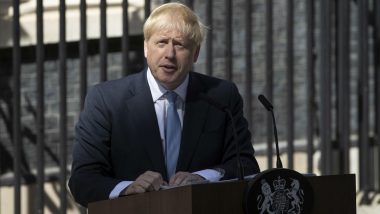London, July 27: The UK government on Monday launched a new anti-obesity drive to help people lose weight and become healthier after what has been pegged as a COVID-19 “wake up call”.
UK Prime Minister Boris Johnson, who has himself lost weight since his own hospitalisation after testing positive for the deadly coronavirus earlier this year, said that getting fitter is important to help protect against the virus as well as the state-funded National Health Service (NHS) from added pressures.
“Losing weight is hard but with some small changes we can all feel fitter and healthier,” said Johnson. Weight Loss Tip of the Week: How Drinking Barley Water Can Help You Lose Weight (Watch Video).
“If we all do our bit, we can reduce our health risks and protect ourselves against coronavirus – as well as taking pressure off the NHS,” he said. “We know obesity increases the risk of serious illness and death from coronavirus – so it's vital we take action on obesity to protect the NHS and improve our nation's health,” added UK Health Secretary Matt Hancock.
The raft of new measures unveiled by the Department of Health and Social Care are being launched alongside a new “Better Health” campaign, led by Public Health England (PHE), which will call on people to embrace a healthier lifestyle and to lose weight if they need to, supported by a range of evidence-based tools and apps providing advice on how to slim down the waistline.
New laws will ban the advertising of food high in fat, sugar or salt (HFSS) on television and online before 9 pm when children are most likely to see them. Ahead of this, the government will also hold a new short consultation on whether the ban on online adverts for HFSS, should apply at all times of the day.
The new legislation will also restrict the promotion of foods high in fat, sugar, such as buy one get one free (BOGOF) offers. There will also be a ban on these items being placed in prominent locations in stores, such as at checkouts and entrances, and online.
Large restaurants, cafes and takeaways with more than 250 employees will be made to add calorie labels to the food they sell to help people make healthier choices and a new consultation will be launched before the end of the year on plans to provide calorie labelling on alcohol to alert people to so-called hidden liquid calories.
The NHS-offered weight management services will be expanded so more people get the support they need to lose weight, including more self-care apps and online tools for people with obesity-related conditions and accelerating the NHS Diabetes Prevention Programme.
The government will also open a consultation to gather views and evidence on the current “traffic light” labelling system on food to learn more about how this is being used by consumers and industry, with the unhealthiest food marked clearly with red. How Besan Chilla Can Aid in Weight Loss: Here’s The Recipe of This Nutritious Dish (Watch Video).
“Everyone knows how hard losing weight can be so we are taking bold action to help everyone who needs it. When you're shopping for your family or out with friends, it's only fair that you are given the right information about the food you're eating to help people to make good decisions,” said Hancock.
“To help support people we need to reduce unhelpful influences like promotions and adverts that affect what you buy and what you eat. Taken together, supported by an inspiring campaign and new smart tools, will get the country eating healthily and losing the pounds,” he said.
According to official statistics, almost two thirds (63 per cent) of adults in England are overweight or living with obesity – and one in three children leave primary school overweight or obese, with obesity-related illnesses costing the NHS 6 billion pounds a year.
The urgency of tackling the obesity "time bomb" has been brought to the fore by evidence of the link to an increased risk from COVID-19, the Department of Health said.
According to a report released earlier by PHE, living with excess weight puts people at greater risk of serious illness or death from COVID-19, with risk growing substantially as body mass index (BMI) increases. Nearly 8 per cent of critically ill patients with COVID-19 in intensive care units have been morbidly obese, compared with 2.9 per cent of the general population.
Therefore, rather than focusing primarily on childhood obesity, the new UK government strategy represents a new focus on empowering adults to lose weight as well.
Dr Alison Tedstone, Chief Nutritionist at PHE: “These plans are ambitious and rightly so. Tackling obesity will help prevent serious illness and save lives. The main reason we put on weight is because of what we eat and drink, but being more active is important too. Making healthier choices easier and fairer for everyone, and ensuring the right support is there for those who need it, is critical in tackling obesity.
“These bold measures will help us tip the scales on obesity. The argument for action is the clearest it's ever been.” Overconsumption of calories is one of the most significant contributing factors in becoming overweight.
Figures show many adults are consuming 200-300 extra calories a day above recommended daily guidelines with children who are already overweight are consuming up to 500 calories more than they need every day.
The measures set out this week are described as a clear signal of government commitment to support individual efforts and kickstart a national effort to tackle obesity.













 Quickly
Quickly


